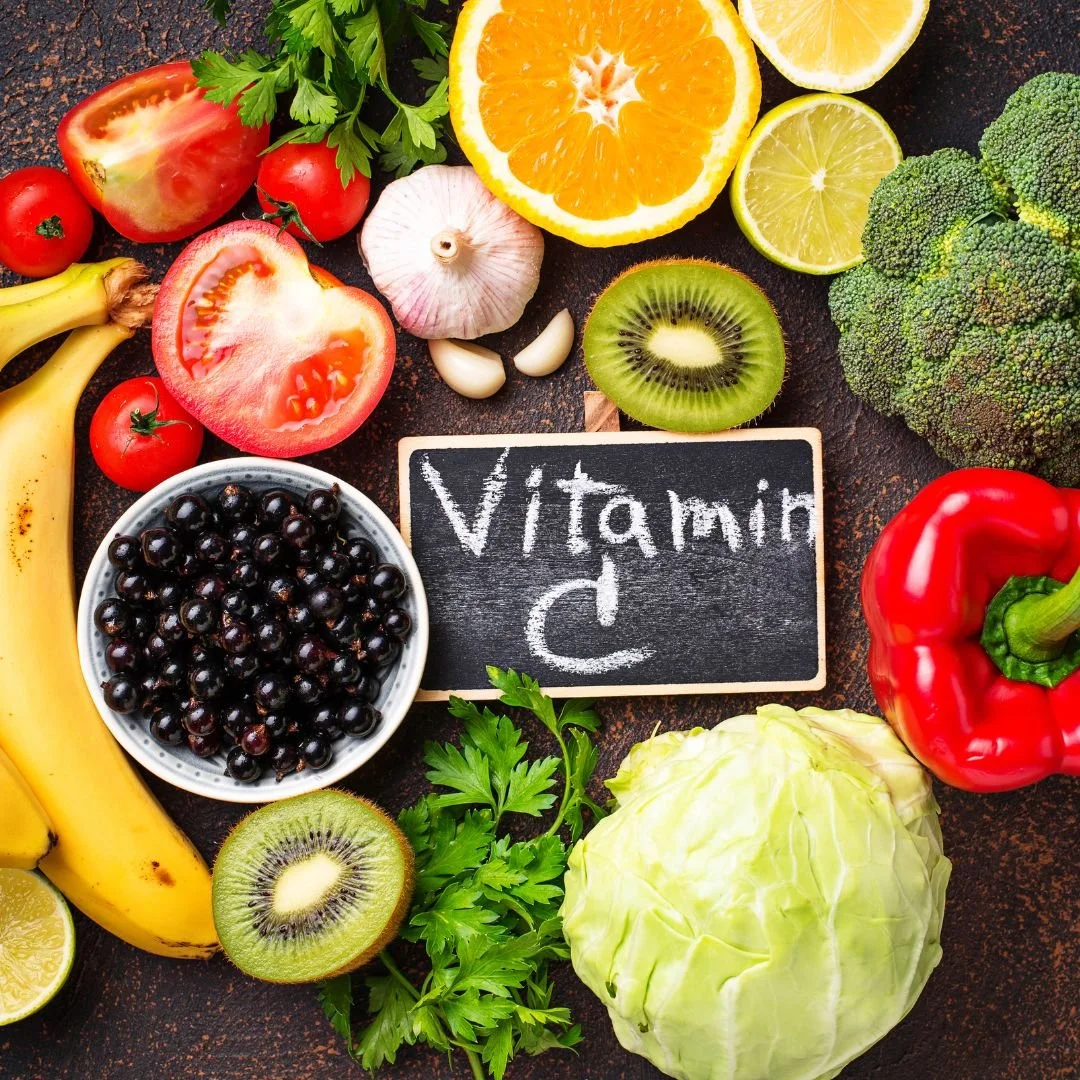Vitamin C
Vitamin C, also known as ascorbic acid, is a water-soluble vitamin that plays several key roles in the body.
Key Role
Antioxidant:
Vitamin C is a potent antioxidant, meaning it helps to neutralize harmful free radicals in the body. Free radicals are molecules produced during normal metabolic processes but can cause damage to cells and DNA if their levels become too high. Vitamin C helps to prevent this damage, reducing the risk of chronic diseases like heart disease and cancer.
Collagen synthesis:
Vitamin C is essential for the synthesis of collagen, a protein that forms the structure of skin, bones, cartilage, and connective tissues. Collagen is crucial for wound healing, maintaining the integrity of blood vessels, and keeping the skin healthy and elastic.
Immune function:
Vitamin C supports the immune system by enhancing the function of various immune cells and promoting the production of antibodies. It helps the body defend against infections and may reduce the severity and duration of colds and other respiratory infections.
Iron absorption:
Vitamin C enhances the absorption of non-heme iron (the type of iron found in plant-based foods and iron supplements) from the diet. This is particularly important for individuals who follow vegetarian or vegan diets, as plant-based sources of iron are less readily absorbed than heme iron from animal products.
Neurotransmitter synthesis:
Vitamin C is involved in the synthesis of neurotransmitters such as serotonin, which plays a role in mood regulation, and norepinephrine, which is involved in the body's stress response..
Optimal Amount/day
The optimal amount of vitamin C intake varies depending on factors such as age, sex, overall health, and specific needs. However, the Recommended Dietary Allowance (RDA) for vitamin C established by the Institute of Medicine (now the National Academy of Medicine) provides general guidelines for daily intake:
For adult men: 90 milligrams per day
For adult women: 75 milligrams per day
Pregnant women: 85 milligrams per day
Breastfeeding women: 120 milligrams per day
These recommendations are based on maintaining overall health and preventing deficiency. However, some individuals may require higher doses of vitamin C under certain circumstances, such as during periods of illness, stress, or when recovering from surgery.
Co-factors
Several cofactors work synergistically with vitamin C to support its functions in the body:
Vitamin E: Vitamin E is another antioxidant that works synergistically with vitamin C to protect cells from oxidative damage. Vitamin E helps to regenerate vitamin C after it has neutralized a free radical, allowing it to continue its antioxidant activity.
Bioflavonoids: Bioflavonoids are a group of phytonutrients found in certain fruits and vegetables, particularly citrus fruits. They enhance the absorption and utilization of vitamin C in the body and may have additional antioxidant properties.
Zinc: Zinc is an essential mineral that plays a role in immune function, wound healing, and DNA synthesis. Vitamin C helps to enhance the absorption of zinc from the diet, and zinc, in turn, supports the activity of vitamin C in various biochemical processes.
Iron: Vitamin C enhances the absorption of non-heme iron (iron from plant-based sources and supplements) in the intestines. Iron is essential for the production of red blood cells and oxygen transport throughout the body.
Copper: Copper is a trace mineral that is involved in collagen synthesis and antioxidant defense mechanisms. Vitamin C aids in the absorption of copper from the diet, and together they support healthy connective tissues and overall antioxidant activity.
Glutathione: Glutathione is a powerful antioxidant that plays a crucial role in detoxification and immune function. Vitamin C helps to regenerate glutathione from its oxidized form, maximizing its antioxidant capacity in the body.
These cofactors work together with vitamin C to optimize its various functions, including antioxidant activity, collagen synthesis, immune support, and nutrient absorption. A balanced diet rich in fruits, vegetables, whole grains, and lean proteins can provide these cofactors in adequate amounts to support overall health and well-being.
Food Sources
Citrus fruits: Oranges, grapefruits, lemons, limes, and tangerines are all rich in vitamin C.
Berries: Strawberries, blueberries, raspberries, blackberries, and cranberries are packed with vitamin C.
Tropical fruits: Pineapples, mangoes, papayas, kiwis, and guavas are delicious sources of vitamin C.
Bell peppers: Especially red and yellow bell peppers, which contain more vitamin C than green ones.
Cruciferous vegetables: Broccoli, Brussels sprouts, cauliflower, and kale are not only rich in vitamin C but also provide other essential nutrients.
Leafy greens: Spinach, Swiss chard, and mustard greens contain vitamin C along with other vitamins and minerals.
Tomatoes: Both fresh tomatoes and tomato products like tomato juice and tomato sauce are good sources of vitamin C.
Potatoes: Particularly sweet potatoes and red potatoes with the skin on are good sources of vitamin C.
Other vegetables: Peas, snow peas, snap peas, and green beans also provide vitamin C.
Including a variety of these fruits and vegetables in your diet can help ensure that you meet your daily vitamin C needs. It's best to consume them fresh and raw or lightly cooked to retain the maximum amount of vitamin C.
Cooking Method
To preserve vitamin C content in foods during cooking, it's best to use methods that involve minimal heat and shorter cooking times. Steaming and stir-frying are preferable to boiling, as they expose the food to lower temperatures and shorter cooking durations. When boiling vegetables, using minimal water and cooking them for a shorter period can help minimize vitamin C loss. Additionally, cutting fruits and vegetables into larger pieces and avoiding prolonged exposure to air can help preserve their vitamin C content. It's also important to avoid overcooking, as prolonged exposure to heat can degrade vitamin C. Overall, gentle cooking methods that retain moisture and minimize cooking time will help preserve the vitamin C content of foods.
Source: OpenAI. (2024). ChatGPT (3.5) [Large language model]. https://chat.openai.com


